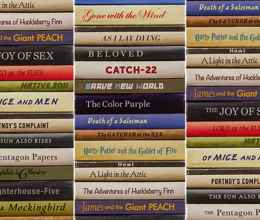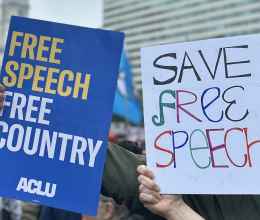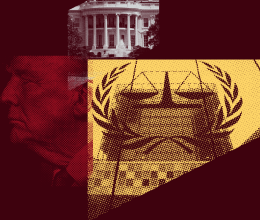The right to free expression is one of our most cherished rights, yet it seems it is constantly under threat. For all the progress we've made - and there has been much - we still find ourselves stuggling with government censorship both by state governments and local school districts.
To draw attention to the censorship that still exists in our country, and to reflect upon the censorship that has been littered throughout our history, we take this opportunity every year to recognize Banned Books Week, an annual celebration of the freedom to read.
Since its inception, the ACLU has fought censorship - because a government that polices what we read can police our thoughts. We have stood up time and time again to challenge restrictions on free expression, even when the ideas being expressed are abhorrent or distasteful. Yet even as we go to such great lengths to support the First Amendment, it is a striking reminder of the importance of free expression to see the actual examples of books, poems, music, and other literary works that have been censored both historically and in our modern time.
The American Library Association keeps a record of the most frequently challenged books every year, and you might be surprised at what makes the list. In 2013, the #1 spot was claimed for the second year in a row by "Captain Underpants," a children's novel series about two fourth graders and a cartoon superhero. Other titles topping the list include "Fifty Shades of Grey" and "The Hunger Games."
A look through the history pages reveals even more shocking censorship. All of the following classic novels have at one time or another been banned: To Kill a Mockingbird, Gone with the Wind, Ulysses, The Catcher in the Rye, Of Mice and Men. So many other great novels could be included here, which highlights one of the most important themes of Banned Books Week: the government should not be the arbiter of what is and is not acceptable reading material. History has shown us that some of our most enduring and influential works of art have at one time been deemed "obscene" or "inappropriate."
We hope you will join us in honoring Banned Books Week, and in the spirit of free expression, you may celebrate however you choose. Maybe you want to read a banned book. Maybe you want to read the ACLU's blog posts on the subject. We definitely recommend you check out our Banned Books Week hub page with all sorts of resources. Whatever you decide, we hope you enjoy Banned Books Week as much as we intend to. Long live the First Amendment!
Raise Your Banned Books In Celebration!
Related Issues
Related content

Weekly Highlights October 14 – 17
October 17, 2025
How NSPM-7 Seeks to Use "Domestic Terrorism" to Target Nonprofits...
October 15, 2025
Weekly Highlights October 6 – 10
October 10, 2025
The Freedom to Read: Defending Libraries and Democracy Against Book...
October 7, 2025
Protecting Free Speech in the Face of Government Retaliation
September 18, 2025
Civil Rights Organizations Urge Students, Parents, and Staff to...
August 26, 2025
Student Speech, Protests, and Walkouts

Court Strikes Down NIH's Unlawful Termination of Research Grants on...
July 21, 2025

